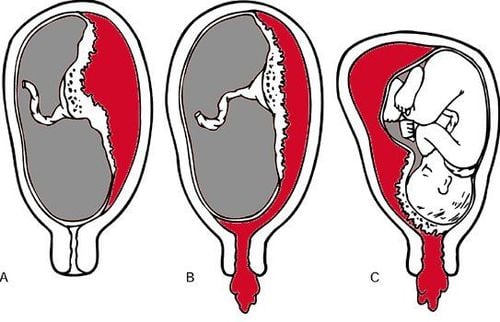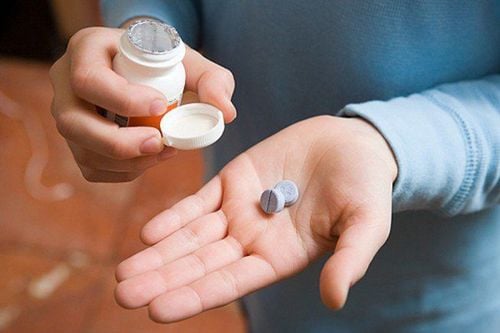This is an automatically translated article.
The article is professionally consulted by Master, Doctor Vo Thien Ngon - Department of General Surgery - Vinmec Da Nang International Hospital
Nocturia is the medical term for frequent urination at night, which can be a medical condition or a common symptom of pregnant women. Nocturia during pregnancy causes women to have to wake up to urinate at night more often than usual, so it significantly affects sleep, reducing sleep quality and quality of life significantly.
1. Causes of nocturia during pregnancy
Due to hormonal changes during early pregnancy leading to an increase in blood and fluid flow in a woman's body, the kidneys will work harder and harder to remove waste from the body.
During the first 3 months of pregnancy, the uterus begins to grow and presses on the bladder. When you have more fluid and your kidneys have to work harder, that means more urine. In addition, the bladder is often stimulated by the uterus pressing on the bladder, so the mother often feels the need to urinate more, both during the day and at night.
2. Is it okay to urinate a lot during pregnancy?

Frequent defecation during pregnancy is common and normal. However, in some cases, a woman's frequent urination can be a sign of a health problem, so you need to have regular medical check-ups to detect any medical conditions, for example:
Bladder infections Frequent urination is one of the signs of a urinary tract infection (UTI) or bladder infection. There are bacteria in the urine of a pregnant woman without any signs or symptoms, but if it is accompanied by a urinary tract infection, it may be accompanied by other symptoms such as pain, burning, just after urinating. wants to continue, has blood in the urine or has a fever.
Gestational diabetes Gestational diabetes is a form of diabetes that appears during pregnancy and goes away after birth. Frequent urination is one of the signs of gestational diabetes along with some other symptoms such as thirst and fatigue. These symptoms are also typical of pregnancy, so it can be difficult to tell the difference between pathological and non-pathological. That's why pregnant women should regularly check their blood sugar at every medical visit.
Other causes
Other causes of frequent urination may include:
Drinking a lot of water or other fluids Using a lot of caffeine Excessive weight gain, which can put pressure on the bladder Medications has the side effect of removing water from the body Medical or traumatic problems affecting the urinary tract or the pelvis .
3. How to improve frequent urination during pregnancy?
For frequent urination during pregnancy without any underlying medical condition, here are a few tips to relieve the discomfort of frequent urination during pregnancy, especially the rash. night.Drink enough water. You probably won't want to drink much because you worry about constantly having to run to the toilet to pee. However, increased urination means the body is losing extra fluid through the urine, so you should continue to drink at least eight glasses of water or other healthy fluids each day to prevent dehydration. Stay away from caffeine. Caffeine is a diuretic, so it removes water from the body, so if you use this substance, you will be more likely to urinate. So, instead of using beverages like coffee, tea and soda, you should opt for caffeine-free beverages. Lean forward as you pee. When urinating, women should lean forward to make it easier to urinate, urinate more often, and empty the bladder completely. Weight control. Gaining too much weight puts extra pressure on the bladder, causing you to urinate more often.
Trắc nghiệm: Bạn có hiểu đúng về dấu hiệu mang thai sớm?
Các dấu hiệu mang thai sớm không phải chỉ mỗi trễ kinh mà còn có rất nhiều dấu hiệu khác như xuất huyết âm đạo, ngực căng tức,… Điểm xem bạn biết được bao nhiêu dấu hiệu mang thai sớm thông qua bài trắc nghiệm này nhé!
Avoid constipation. When stool is in the intestines, it takes up more space in the abdomen increasing the pressure it pushes against the bladder. During pregnancy, it's hard to avoid constipation completely, but you should do your best by eating the right amount of fiber, drinking enough water, and doing light exercise. Know the signs of a UTI and how to prevent it. Pay attention to your body, any signs of changes in the frequency of urination, and symptoms of a urinary tract infection. To avoid infection, you should urinate as soon as you feel the urge to have a bowel movement and try to completely empty your bladder with each bowel movement, keep the perineal area clean, and always wipe from front to back. Rest. Waking up at night to go to the bathroom makes you tired during the day, so you should take a nap if possible, or at least try to sit and rest during work. Urinate before going to bed. Try to pee before you go to bed. One thing to note is that the distance from the bed to the toilet must be safe, there are no obstacles, the light switch is placed in a convenient position to ensure safety.

Use Kegel Exercises
Although you may not be able to eliminate polyuria completely, you can strengthen the pelvic floor muscles. This will help women better control bladder function during pregnancy and postpartum, limiting some discomfort. To strengthen the pelvic floor muscles, you should do Kegel exercises, which are exercises that contract and relax the muscles around your vagina. The exercise is as follows:
Imagine that you are trying to stop “farting” (farting). Tighten the pelvic floor muscles. Another way is when you are urinating you try your muscles to stop urinating, if stopping is correct. Do these exercises at least 3 times a day. Every day, use 3 positions: lying, sitting and standing. You can practice while lying on the floor, sitting at a table, or standing in the kitchen. Be patient, don't give up. Just 5 minutes, 3 times a day. You can improve your bladder control after 3 - 6 weeks. If you have trouble performing this exercise, see your doctor. To assist you in performing this exercise, your doctor will apply a small electrical current to the pelvic floor muscles. The electric current will cause the muscles to contract, causing a buzzing sensation in the stimulated muscle area.
Doctor Vo Thien Ngon has over 7 years of experience working as a urologist and surgeon at Hospitals: Hue Central Hospital, Hue University of Medicine and Pharmacy Hospital, Tam Tri Da Nang General Hospital .
Doctor Ngon with the ability to specialize in the field of examination and treatment of diseases of the Urology and Andrology system, Urology surgery, endoscopic urological surgery, Laparo urinary tract surgery, endoscopy Urinary. Currently, Dr. Vo Thien Ngon is a Urology - Orthopedic Surgery Doctor, Department of General Surgery, Vinmec Da Nang International Hospital
Please dial HOTLINE for more information or register for an appointment HERE. Download MyVinmec app to make appointments faster and to manage your bookings easily.














